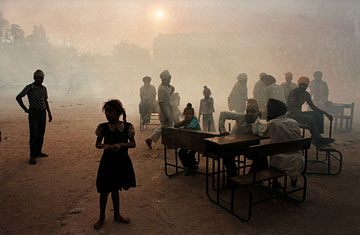
Sikh refugees seek shelter in a New Delhi schoolyard in the violent days of anti-Sikh riots following the assassination of Prime Minister Indira Gandhi in 1984
(2 of 2)
Initially a response to the death of a beloved leader that unfolded mostly in the poorer parts of west and north Delhi, the events of the days that followed became much more organized, spreading strategically across the city, including upper-class and diplomatic neighborhoods. Eyewitnesses have repeatedly told stories of the police looking on as rioters murdered and raped, having gotten access to voter records that allowed them to mark Sikh homes with large Xs, and large mobs being bused in to large Sikh settlements. "On Oct. 31, there was primarily looting and arson attacks," says Jaskaran Kaur, co-director of Ensaaf, a U.S.-based nonprofit that works in the predominantly Sikh state of Punjab. "On Nov. 1, you see that everything happened very methodically — there were simultaneous attacks following similar patterns where the gurdwara was often attacked first before the residences and properties, and the death squads were able to make extensive use of state infrastructure like buses and trains." Despite this, the army was not called in until days later. "We saw what they did and who did it," says Surinder Kaur. "We saw the local politicians marking up our homes. At the time, we didn't know what it was for."
But while 10 official commissions have been set up over the years to investigate the events of the four days, only a handful of minor convictions have been made, and not one major politician or police officer has been convicted. "The justice system is based on evidence, and people are scared to come forward or are persuaded not to," says political analyst Amulya Ganguli. During the riots, Kaur of Ensaaf says the government "worked to destroy a lot of the evidence about who was involved with the killings by refusing to record [first information reports] or name those that family members mentioned."
Instead, in March 2009, India's Central Bureau of Investigation filed its final report on the riots, clearing Jagdish Tytler, one of the accused who had major political ambitions and was announced as a candidate for Indian parliament elections in 2009. Tytler had been accused of leading mobs of thousands during the riots, and though he was named by several eyewitnesses, he was ultimately exonerated because of lack of concrete evidence. Hundreds of Sikh protesters gathered outside the courts afterward, and Sikh journalist Jarnail Singh threw a shoe at Home Minister P. Chidambaram during a press conference in April, following his remarks on the matter. The Congress Party was forced to drop Tytler, and another accused, Sajjan Kumar, as candidates for the election to protect its image.
Outside of India, too, Sikhs have been making a consistent effort to get more international attention to the lack of accountability for what happened. In the 2005 elections in Britain, the country's 700,000- strong Sikh community banded together to make it a campaign issue. For the 25th anniversary of the event later this month, advertisements by Ensaaf — showing an old woman wiping away her tears, with the words, "25 years ago, our loved ones were burned alive in front of our eyes," and in the next line, "Why has India, the world's largest democracy, denied us justice?" — are scheduled for the month of November in the San Francisco Bay Area's transit system.
But many Sikhs in India seem to have been quick to move on. While there is still a large community waiting for justice and, in some cases, compensation, the deep distrust that once existed between the community and the Congress Party has dissipated. The party has been in power in Punjab for many years, and party chief Sonia Gandhi — daughter-in-law of Indira Gandhi — helped by formally apologizing to the Sikh community in 1998. In September, India's cabinet also extended a $1.5 million rehabilitation package for victims. "It doesn't exonerate the Congress, but by and large the Sikh community agrees that it was a one-off thing and there is no anti-Sikh philosophy in any political party and [the incident] was not a result of a clearly articulated worldview, as it has been with Muslims in the country," says Ganguli.
Many, however, feel that more compensation — which was insufficient and delayed to begin with — is not the answer. Jaskaran Kaur suggests starting with a truth commission, a special prosecutor's office and a wide range of services, including rehabilitation of family members, physical and mental services and acknowledgement of the event in the form of museums, history books and convictions. "Apologizing doesn't amount to much for family members unless the state is going to acknowledge its role in the massacres and then take serious steps for accountability."
For Surinder Kaur, it no longer matters. The safe haven provided by the government made her community unsafe a long time ago. "We haven't allowed our children to mix with anyone in this neighborhood," she says of the widows' colony. "One day, they'll get out of here, and there will be a new beginning."
